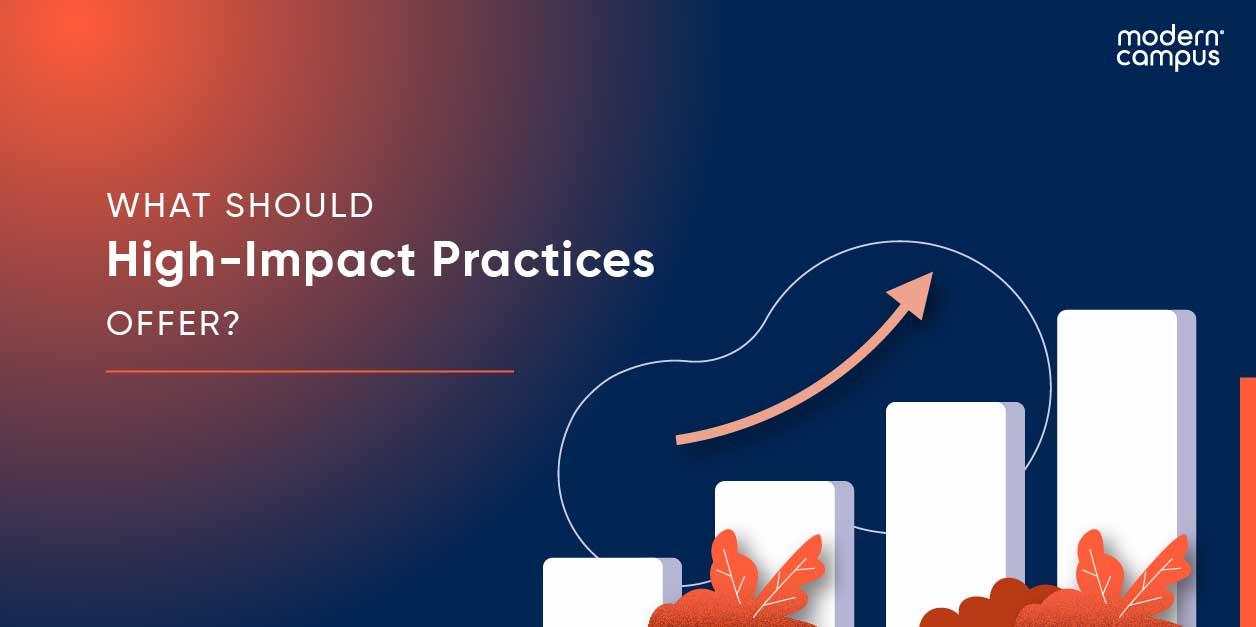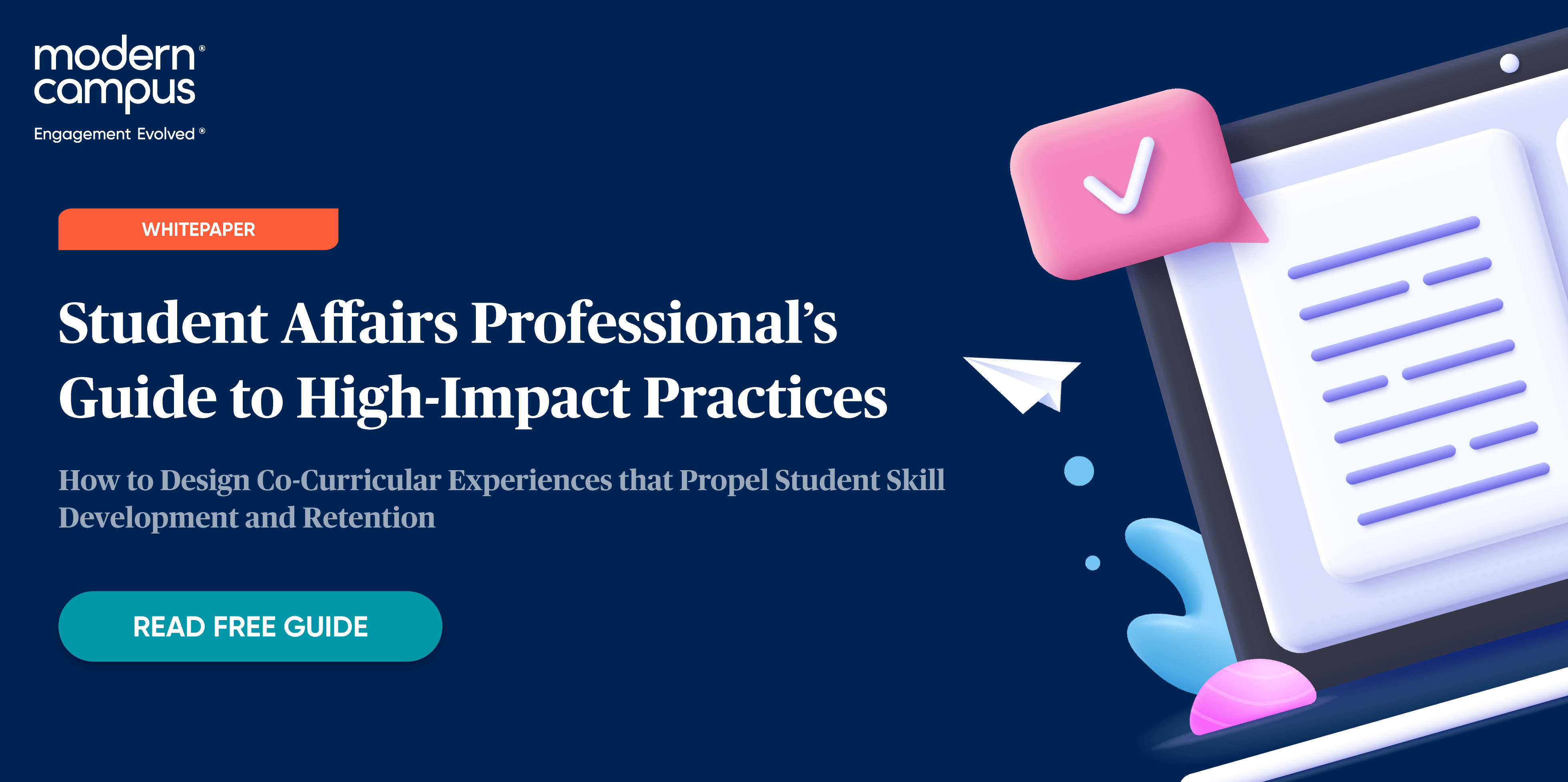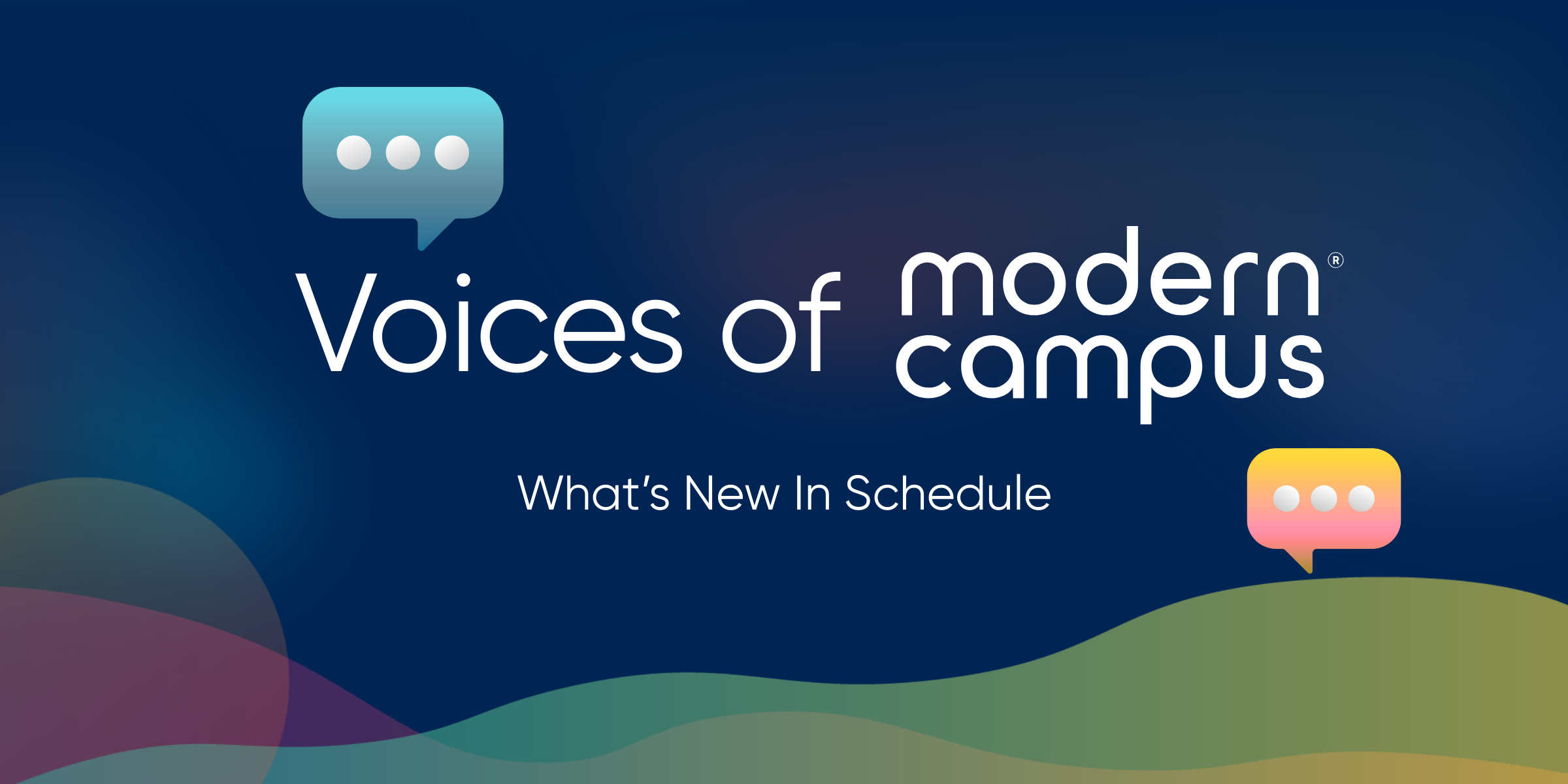How Any Student Affairs Professional Can Design a High-Impact Practice
What are high-impact practices?
High-impact practices are active, ongoing learning practices that promote deep learning experiences and engagement. Research has shown that participating in high-impact practices increases student retention, workforce readiness, and success inside and outside the classroom.
But high-impact practices do so much more than the name reveals, and must hit many hidden qualifiers to accurately and deservedly be considered HIPs.
To get into that, let’s reconnect with educational researcher and theorist George Kuh.
In his 2008 ebook, High-Impact Educational Practices: What They Are, Who Has Access to Them, and Why They Matter, published by the Association of American Colleges and Universities, Kuh detailed six essential qualities of the very best co-curricular experiences.
These experiences aren’t one-time programs that offer students free pizza and little else;. they are long-term experiences that are intentionally designed to foster student success during learners’ time at the institution and beyond.
That is what makes them high-impact practices for student success.
What should high-impact practices offer?
According to Kuh, HIPs must offer the following:
1. Considerable time and effort requirements for students
HIPs “demand that students devote considerable time and effort to purposeful tasks [and] require daily decisions that deepen students’ investment in the activity as well as their commitment to their academic program and the college.”
2. Meaningful interactions between faculty and students
They challenge students to interact with faculty and peers “about substantive matters, typically over extended periods of time.”
3. Collaboration with people of diverse backgrounds
HIPs “increase the likelihood that students will experience diversity through contact with people who are different from themselves… [and] challenge students to develop new ways of thinking about and responding immediately to novel circumstances as they work side-by-side with peers on intellectual and practical tasks, inside and outside the classroom, on and off-campus.”
4. Constant, Consistent Feedback
HIPs offer frequent feedback about their performance, and “because students perform in close proximity to supervisors or peers, feedback is almost continuous.”
5. Opportunities to apply concepts in real-world settings
They provide opportunities for students to “see how what they are learning works in different settings, on and off-campus.”
6. Reflection and integrative learning opportunities
HIPs “deepen learning and bring [students] values and beliefs into awareness … [they] help students develop the ability to take the measure of events and actions and put them in perspective. As a result, students better understand themselves in relation to others and the larger world, and they acquire the intellectual tools and ethical grounding to act with confidence for the betterment of the human condition.”
Types of High-Impact Practices in Higher Education
The National Survey of Student Engagement (NSSE) and the Association of American Colleges
and Universities (AAC&U) consider the following co-curricular experiences to be high-impact
practices—when they are intentionally designed as such and meet Kuh’s requirements
outlined above.
1. First Year Seminars
First-year seminars are led by faculty members from a range of disciplines throughout the institution. Through these experiences, students develop essential academic skills—such as writing, critical thinking, and evidence-based research practices—that support their success in all subsequent courses. Ideally, first-year seminars have a small number of students, fostering vibrant discussions, respectful debate, and inquiry with faculty.
2. Service Learning
With service learning, students are challenged to apply classroom lessons to “real world” settings and to meet community needs. Service-learning projects benefit both the provider (the students) and the recipients (your community partners). As its name implies, the focus is dually on service and learning, which is fully integrated into an academic curriculum.
Note that service learning is not the same as community service. The latter does not incorporate academic or civic learning components and, therefore, is not a HIP.
Read our Ed Centerpiece for more: What You Need to Know to Design a Service Learning Project.
3. Learning Communities
Learning community participants take at least one class together and meet regularly with a faculty member outside of class. Many learning communities explore a topic together or read a common book. It’s a cohort experience that offers increased support for students with related majors while fostering exceptional teamwork, innovation, and communication skills.
Living-learning communities (LLCs) are a popular version of this. They are specialized academic experiences integrated with residential and campus living.
4. Undergraduate Research
Participants of this type of HIP conduct research and work in partnership with faculty. Students are encouraged to explore a real problem, question, or theory by learning how to design, collect, test, and analyze data. Some students even have the opportunity to present their research at conferences or in research papers, allowing them to begin contributing to their field of study as undergraduates.
This HIP teaches valuable skills in critical thinking, research, quantitative reasoning, and writing. Research with faculty is a rewarding experience for all students but is especially beneficial for those wanting to pursue graduate or professional degrees.
5. Internships & Field Experiences
Internships and field experiences give students direct industry experience while satisfying course requirements. Students learn what it’s like to collaborate with co-workers, learn from supervisors and initiate their own projects in a career field that correlates with their academic interests. Ideally, interns are also matched with mentors— either from within the workplace or their institutions—who encourage students to consider their career fit.
6. Study Abroad
When studying abroad, students engage with new people, cultures, social norms, traditions, socio-economic concerns, and political issues. By learning to understand better and appreciate different worldviews and lifestyles, students will be prepared to collaborate with diverse groups in the workforce.
7. Capstone Project/Culminating Experience
A capstone project is the summation of a student’s collegiate work. Ranging from research to dissertations, art portfolios, and performances, this HIP showcases what students have learned inside and/or outside of the classroom and how that knowledge will apply to their lives post-graduation.
In order to effectively assess a senior experience or capstone project, you can require students to present their work in various ways. For example, they can showcase their research at an on-campus undergraduate exhibition or local professional conference. Or they can host a public presentation at a gallery or on stage in a performance hall.
Why should your institution implement high-impact practices?
Just as high-impact practices are more demanding in their expectations of students, they also offer more rewards than non-HIP programs—for individual students and for the institution as a whole.
Ideally—and to truly transform the landscape of higher education—colleges, and universities won’t merely offer a handful of high-impact practices that a small percentage of the student body will participate in. Rather, Kuh advises institutions to “make it possible for every student to participate in at least two high-impact activities during [their] undergraduate program, one in the first year and one taken later in relation to the major field.”
Benefits of High-Impact Practices
Kuh, along with Jillian Kinzie, Jayne E. Brownell & Lynn E. Swaner, found that HIPs are positively associated with:
- Persistence and GPA
- “Deep approaches to learning”
- Higher rates of student-faculty interaction
- Increases in critical thinking and writing skills
- Greater appreciation for diversity
- Higher student engagement overall
All of this means that students involved in HIPs are more likely to stay enrolled, graduate with strong GPAs and impress prospective employers with their acquisition of essential skills.
Or put simply:
“High-impact practices can help students develop skills that are essential in the workplace and that transfer to a wide range of setting —such as communication, problem-solving and critical thinking. In addition, they can give an institution a distinctive and competitive edge at a time when many colleges and universities are struggling to maintain enrollments.” — Richard F. Vaz, director of the Center for Project-Based Learning at Worcester Polytechnic Institute, writing for Inside Higher Ed
What’s more, Ashley Finley and Tia McNair found these benefits to be even more pronounced among students who identify with historically marginalized demographics.
“Historically underrepresented or underserved (e.g., racial minorities, first-generation) students who participated in more than one high-impact practice reported significantly greater gains in ‘deeper learning’ and learning outcomes than their peers who reported involvement in only one high-impact practice.” — Summary from the Center for Engaged Learning
Last updated: June 16, 2023





